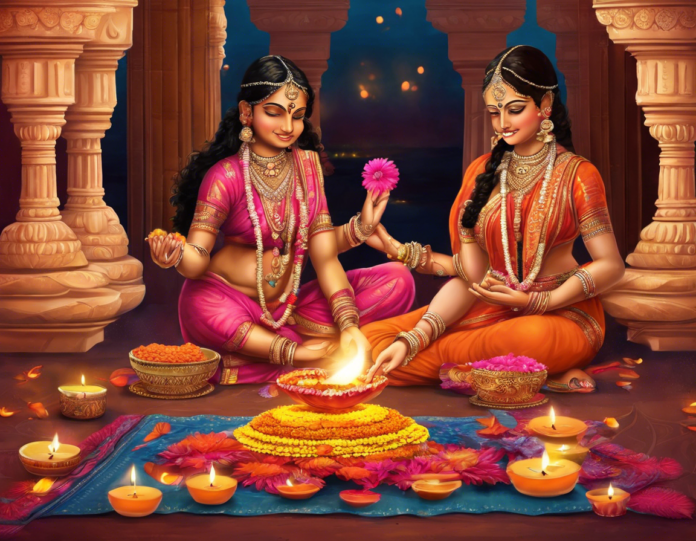The festival of Diwali, known as the “Festival of Lights,” is one of the most important and widely celebrated Hindu festivals in India and around the world. It symbolizes the victory of light over darkness and good over evil. One of the key rituals during Diwali is the Diwali Puja, a traditional ceremony performed to invoke the blessings of the deities and seek prosperity and happiness for the upcoming year.
Diwali Puja is typically performed during a specific time window on Amavasya, the darkest day of the month, in the Hindu lunisolar calendar, which usually falls in October or November. Performing the Puja at the auspicious time is considered highly beneficial and is believed to yield positive results for the worshipper. In this comprehensive guide, we will explore the significance of Diwali Puja and provide you with all the essential information you need to perform the Puja at the right time.
Significance of Diwali Puja
Diwali Puja holds immense significance in Hindu culture and is believed to bring blessings, prosperity, and happiness to the worshipper. The Puja is performed to honor and invoke the blessings of Goddess Lakshmi, the deity of wealth and prosperity, and Lord Ganesha, the remover of obstacles. It is believed that conducting the Puja with devotion and sincerity can attract wealth, success, and good fortune into one’s life.
Diwali Puja Time
The timing for Diwali Puja is crucial, as it is believed that performing the Puja during the Lakshmi Puja Muhurat (auspicious time) can enhance the benefits and blessings received. The ideal time for Diwali Puja is determined based on the principle of Pradosh Kaal, which is a specific time window that is considered highly favorable for performing various rituals, including the Diwali Puja. The Pradosh Kaal usually falls during the evening hours, and the Puja should be performed during this period for maximum benefits.
How to Determine Diwali Puja Time
To determine the exact timing for Diwali Puja, you can consult a Hindu Panchang (almanac) or an online astrological website, which provides detailed information about the auspicious timings for various rituals and ceremonies. The Lakshmi Puja Muhurat is calculated based on the positioning of the planets and stars and may vary slightly each year. It is essential to perform the Puja during this specific time to harness the positive energies and blessings associated with the festival of Diwali.
Steps to Perform Diwali Puja
Performing the Diwali Puja involves a series of rituals and offerings to the deities. Here is a step-by-step guide to help you perform the Puja with devotion and reverence:
Preparations:
- Cleanse the house thoroughly and decorate the altar with fresh flowers, rangoli, and diyas (earthen lamps).
- Arrange the Puja items, including incense sticks, camphor, ghee, fruits, sweets, and coins for offering.
Invocation:
- Begin the Puja by lighting the lamp and incense sticks to purify the surroundings.
- Invoke the blessings of Lord Ganesha by chanting Ganesh Mantra and offering Durva grass and Modak sweets.
Lakshmi Puja:
- Invoke Goddess Lakshmi by chanting Lakshmi Mantra and offer flowers, fruits, and sweets as Naivedya.
- Perform Aarti to seek the blessings of the deity and offer camphor as a symbol of light and purity.
Distribution of Prasad:
- After the Puja, distribute Prasad (blessed offerings) to your family members and guests as a symbol of sharing the divine blessings.
Frequently Asked Questions (FAQs)
Q1: Can Diwali Puja be performed by anyone, regardless of their religious beliefs?
A1: Yes, Diwali Puja can be performed by anyone who wishes to seek blessings, prosperity, and happiness, irrespective of their religious affiliation.
Q2: What are the benefits of performing Diwali Puja?
A2: Performing Diwali Puja is believed to attract wealth, success, and happiness into one’s life, and it also promotes positivity and harmony in the household.
Q3: Can Diwali Puja be performed at home, or is it necessary to visit a temple?
A3: Diwali Puja can be performed at home by following the traditional rituals and procedures. It is not mandatory to visit a temple for the Puja.
Q4: What are the essential items required for Diwali Puja?
A4: The essential items for Diwali Puja include incense sticks, camphor, ghee, fruits, sweets, flowers, diyas, and coins for offering.
Q5: Is it necessary to perform Diwali Puja during the auspicious time mentioned in the Panchang?
A5: It is highly recommended to perform Diwali Puja during the auspicious time mentioned in the Panchang to maximize the benefits and blessings received.
In conclusion, Diwali Puja is a sacred ritual that holds great significance in Hindu culture and is performed to seek the blessings of Goddess Lakshmi and Lord Ganesha. By performing the Puja with devotion and following the prescribed rituals, one can attract prosperity, happiness, and success into their life. Remember to perform the Puja during the auspicious time mentioned in the Panchang and may this Diwali bring abundance and joy to you and your loved ones.
